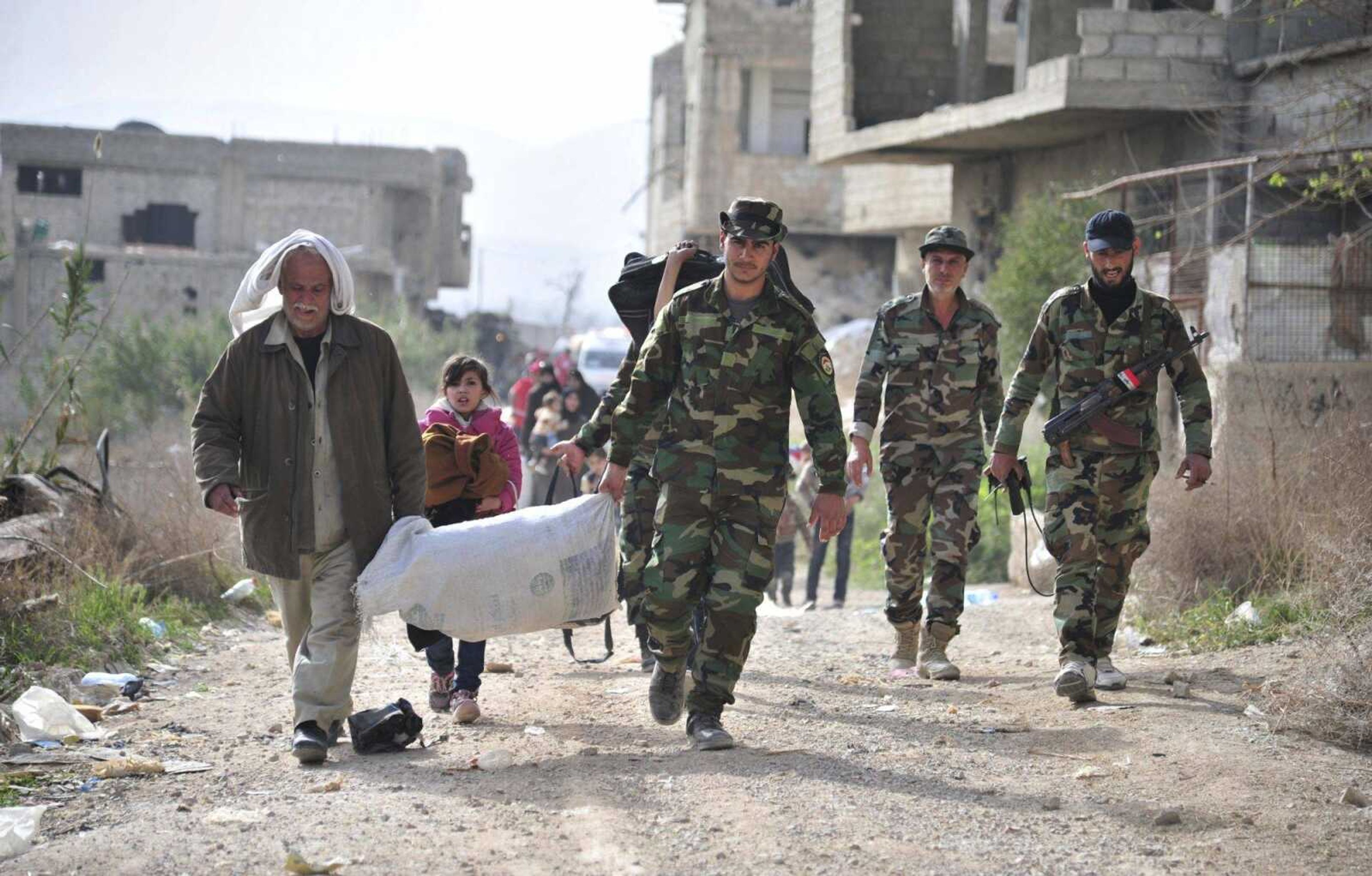Syrian rebels to leave key town in eastern Ghouta enclave
BEIRUT -- Syrian rebels and their families boarded government buses Thursday before departing a besieged town in the eastern Ghouta suburbs of Damascus, in a deal perhaps seeing the bombed-out town handed over to the government following years of siege...
BEIRUT -- Syrian rebels and their families boarded government buses Thursday before departing a besieged town in the eastern Ghouta suburbs of Damascus, in a deal perhaps seeing the bombed-out town handed over to the government following years of siege.
It is the first such arrangement for a town inside the besieged enclave, which has endured more than one month of relentless shelling and bombardment as the government, backed by its ally Russia, pushed to retake the region after seven years of revolt.
An Associated Press cameraman saw hundreds of people, including fighters, loaded into more than a dozen white buses lined along a main highway just outside the town of Harasta before heading to opposition-held parts of northern Syria. Syrian TV said they included 1,824 people and 319 fighters.
Carrying their light weapons, some of the fighters left their buses and prayed on the Harasta highway.
As rebels prepared to depart the town of Harasta, thousands of civilians streamed out of other areas in eastern Ghouta that were still being bombed by the government. They included dozens of civilians who appeared to be wounded, some hobbling on crutches, another with an eye injury.
The government's assault has sparked a tide of displacement in the Damascus suburbs as civilians try to escape the violence. Some have moved deeper into the rebel-held enclave, while some 50,000 others have crossed the front-lines, to government authorities.
The government's air and ground assault, which escalated Feb. 18, has seen the once sprawling territory at the doors of the capital shrink to three disconnected rebel-held islands. The evacuation by Ahrar al-Sham rebels from Harasta, if it goes through Thursday, could serve as a blueprint for other rebels in other towns, bringing President Bashar Assad's government closer to recapturing the entire territory.
The international medical charity Doctors Without Borders said the advancing government forces had captured or destroyed 19 of the 20 hospitals the group was supporting just one week ago. It said medical staff were fleeing the approaching front lines.
Rebels hold just 20 percent of the eastern Ghouta territory they held one month ago, according to the Britain-based Syrian Observatory for Human Rights monitoring group. But the territory includes several densely populated residential zones including Douma, the largest town in eastern Ghouta.
The Observatory said some 4,000 people evacuated Douma since Wednesday. The Russian military said more than 5,000 people left eastern Ghouta.
Rebels and the government exchanged 18 prisoners ahead of the Harasta evacuation, according to pro-government media.
The 13 men released by the Syrian rebels identified themselves to the media outside Harasta as soldiers and civilians attached to the Syrian army, who were captured by rebels in the fighting for Harasta. Crying in relief, they thanked God, the Syrian army and President Assad for their freedom.
The deal for Harasta will see 1,500 rebels and 6,000 civilians leave to a rebel-held province in northwest Syria, according to the state-affiliated Military Media Center.
Monther Fares, a spokesman for the rebel faction Ahrar al-Sham, confirmed his group's fighters were preparing to depart. Fares said the rebels agreed to leave because of "civilian pressure" resulting from intensive airstrikes and "warplanes that do not leave the sky," adding residents of Harasta have spent the last three months inside shelters.
But the arrangement leaves other fighters for the Failaq al-Rahman group still inside. They government is threatening to move on them if they do not also agree to depart.
State-affiliated al-Ikhbariya TV cast the deal as a victory for the country. Its correspondent Rabieh Dibeh said the government would restore its authority over Harasta once the "terrorists" left the town. He said defectors from the army would be ordered to rejoin the service.
Critics say it is a formula for displacement legitimizing the government's brutal siege tactics depriving hundreds of thousands of civilians of food and medicines and subjecting them to a half-decade of violence. Numerous, top U.N. officials have likened the tactics to war crimes and crimes against humanity.
Connect with the Southeast Missourian Newsroom:
For corrections to this story or other insights for the editor, click here. To submit a letter to the editor, click here. To learn about the Southeast Missourian’s AI Policy, click here.








